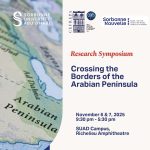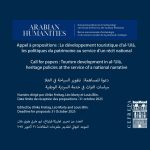Transversal Axis II
Transversal Axis II
The renewal of religious thought in Islam in the contemporary era
Centered on the dynamics currently carried by writers and intellectuals of the Arab world in general and the Arabian Peninsula in particular, this second transversal axis mobilizes the efforts of historians, political scientists, anthropologists, philosophers or sociologists in order to identify new centers for the renewal of the religious thought in Islam.Although the theme goes back to the Nahda and to the works of pioneers such as Rifâ’a al-Tahtawî, Mohammad Abdou, Jamel-Eddin al-Afghanî, Khayr-Eddîn al-Tounisî or Qâsim Amîn, the interest in reading the founding texts of Islam, and of the theological-legal corpora that have been grafted onto them, has continued to grow during the 20th century and beyond.
Numerous studies have enabled the establishment of a dynamic that schematically opposes conservatives and progressives, traditionalists and modernists. The advent of religious ideologies structured around social projects (Salafism, Islamism, Sahwa) has nourished this dynamic and maintained lively debates on the relationship between politics and religion in Islam, on the status of women (the polygamy, the wearing of the veil, equal rights, etc.) or, after the Arab revolutions of 2011, on the type of government and constitution that should be put in place. Thus, the vitality of the movements which work for the maintenance of the Tradition or for the reactivation of models of extreme thought and the adoption of behaviors justifying violence by religion are opposed to the individual or collective dynamics which engage in the opposite paths of the rational approach to classical corpuses and the criticism and deconstruction of ideologies based on sacred texts.
The establishment of this axis within CEFREPA will make it possible to make known the work of several authors who have studied these questions and to engage with them in a dialogue nourished by the renewal of the field of French Islamology which has benefited recently the creation of the IFI (French Institute of Islamology) and the promotion of work in this direction. Despite the centrality of certain fields for the approach to these subjects, such as Egypt (the Farag affair then Abu Zayd) or Tunisia (debates on the equality of inheritance between men and women), the countries of the Arabian Peninsula today enjoy a significant development of discussions around these subjects, either because of the presence of a strong tradition of intellectual debate and freedom of thought (Kuwait for example), or thanks to the accelerated reconfiguration of the field of religious thought as shown by the example of Saudi Arabia which, from 2019, carried out a major reform in the field of education through the introduction of the teaching of philosophy and of critical thinking, once non-existent in the kingdom.
Within the framework of these recent developments, CEFREPA welcomes young researchers (masters, doctoral students) and researchers in post to carry out their work and better understand the actors of the renewal of the readings of the founding texts and the development of scientific criticism nourished by the methodologies of the humanities and social sciences. Among the research projects conducted by CEFREPA members, mention should be made of the link between politics and religion, whether in European contexts or those of the Arab world (secularization, the nature of the state in Islam, the problem of the return of the caliphate), the question of religious tolerance or intolerance, in particular through the examination of the question of freedom of conscience, still undermined in certain countries because of the criminalization of apostasy (al- ridda) and the refusal to admit the voluntary choice of individuals with regard to theological questions.










